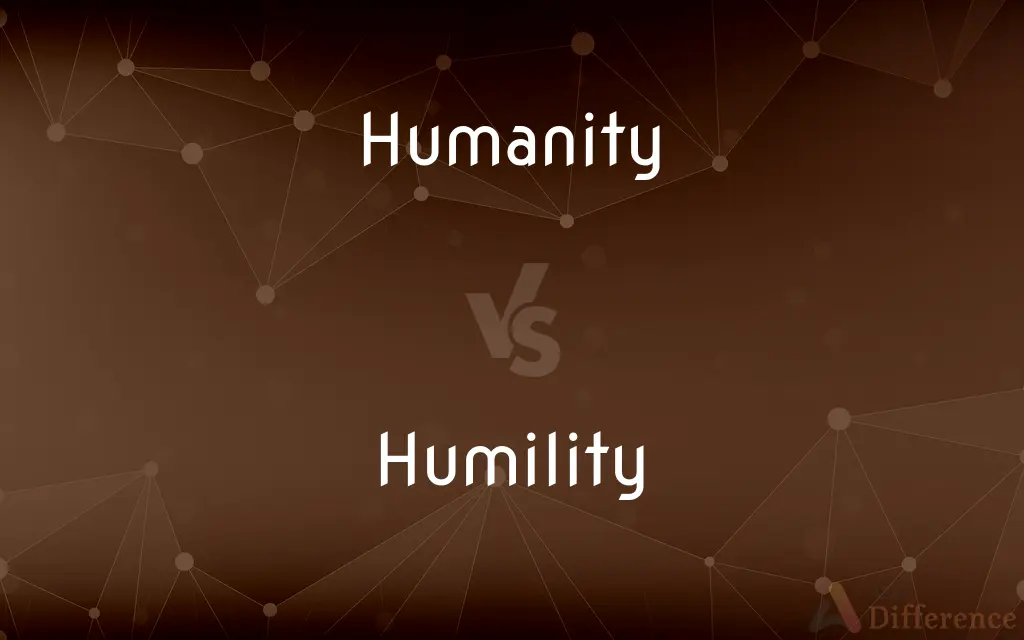Humanity vs. Humility — What's the Difference?
By Maham Liaqat & Urooj Arif — Updated on March 28, 2024
Humanity reflects the collective qualities of humans, while humility denotes a personal attribute of modesty and respectfulness.

Difference Between Humanity and Humility
Table of Contents
ADVERTISEMENT
Key Differences
Humanity encompasses the characteristics, behaviors, and attributes that are considered to be inherent in human beings, including aspects of kindness, compassion, and social interaction. It often refers to the collective qualities of the human species, emphasizing traits that are universally recognized across cultures. Humility, on the other hand, is a personal virtue characterized by a lack of arrogance and a respectful acknowledgment of one's limitations and the value of others. It involves a down-to-earth perspective and a genuine appreciation of others' strengths and contributions without seeking undue attention for oneself.
While humanity broadly covers the shared experiences and traits that connect people, including empathy, moral principles, and the capacity for cultural achievements, humility focuses more narrowly on an individual's attitude and behavior towards themselves and others. Humility fosters an environment where the accomplishments and worth of others are celebrated, whereas humanity as a whole benefits from acts of kindness and empathy that strengthen social bonds.
Humanity is often discussed in the context of global issues, ethics, and the collective action of societies to uphold moral values and foster the well-being of all people. Humility, in contrast, is usually considered within personal or interpersonal dynamics, highlighting the importance of modesty and the recognition of one's own fallibility in relation to others.
The expression of humanity can be seen in actions and initiatives aimed at promoting social welfare, peace, and understanding among different cultures and communities. Humility, however, manifests in individual behaviors, such as deferring to others' opinions, recognizing and admitting mistakes, and valuing others' contributions without feeling threatened or diminished.
Humanity and humility are interconnected in that the practice of humility by individuals can contribute to the broader goals of humanity by fostering mutual respect, understanding, and compassion among people. Humble behaviors and attitudes can enhance societal efforts to address injustice, inequality, and conflict, demonstrating how personal virtues can have a significant impact on the collective well-being of humanity.
ADVERTISEMENT
Comparison Chart
Definition
The collective qualities and behaviors of human beings.
A personal virtue of modesty and lack of arrogance.
Scope
Collective, pertaining to all humans.
Personal, relating to an individual's attitude.
Key Characteristics
Empathy, compassion, cultural achievements.
Modesty, self-awareness, respect for others.
Expression
Through acts of kindness, cultural practices.
Through personal behavior, acknowledgment of limitations.
Impact
On societal norms and global ethics.
On personal and interpersonal relationships.
Compare with Definitions
Humanity
Cultural Achievements.
The diverse cultures of the world reflect the richness of humanity.
Humility
Recognition of Limitations.
Acknowledging he didn't have all the answers was a sign of his humility.
Humanity
Moral and Ethical Concerns.
Debates on human rights issues are central to our understanding of humanity.
Humility
Lack of Arrogance.
Her humility was evident in the way she shared credit with her team.
Humanity
Collective Human Qualities.
The spirit of humanity is often showcased through acts of kindness and solidarity during crises.
Humility
Respectfulness.
His humility allowed him to listen deeply to others' perspectives without judgment.
Humanity
Empathy and Compassion.
Humanity's empathy enables us to feel connected even across great distances.
Humility
Modesty.
Despite her achievements, she remained humble, always downplaying her own success.
Humanity
Social Interaction.
Humanity thrives on the social bonds that connect people from various backgrounds.
Humility
Valuing Others.
Humility involves elevating the contributions of others above one's own accomplishments.
Humanity
Humans considered as a group; the human race.
Humility
Humility is the quality of being humble. Dictionary definitions accentuate humility as a low self-regard and sense of unworthiness.
Humanity
The condition or quality of being human.
Humility
The quality or condition of being humble.
Humanity
The quality of being humane; benevolence.
Humility
The characteristic of being humble; humbleness in character and behavior.
Humanity
A humane characteristic, attribute, or act.
Humility
The state or quality of being humble; freedom from pride and arrogance; lowliness of mind; a modest estimate of one's own worth; a sense of one's own unworthiness through imperfection and sinfulness; self-abasement; humbleness.
Serving the Lord with all humility of mind.
Humanity
The languages and literatures of ancient Greece and Rome; the classics.
Humility
An act of submission or courtesy.
With these humilities they satisfied the young king.
Humanity
Those branches of knowledge, such as philosophy, literature, and art, that are concerned with human thought and culture.
Humility
A disposition to be humble; a lack of false pride;
Not everyone regards humility as a virtue
Humanity
; human beings as a group.
Humility
A humble feeling;
He was filled with humility at the sight of the Pope
Humanity
The human condition or nature.
Humanity
The quality of being benevolent; humane traits of character; humane qualities or aspects.
Humanity
Any academic subject belonging to the humanities.
Philosophy is a humanity while psychology is a science.
Humanity
The quality of being human; the peculiar nature of man, by which he is distinguished from other beings.
Humanity
Mankind collectively; the human race.
But hearing oftentimesThe still, and music humanity.
It is a debt we owe to humanity.
Humanity
The quality of being humane; the kind feelings, dispositions, and sympathies of man; especially, a disposition to relieve persons or animals in distress, and to treat all creatures with kindness and tenderness.
Humanity
Mental cultivation; liberal education; instruction in classical and polite literature.
Polished with humanity and the study of witty science.
Humanity
The branches of polite or elegant learning; as language, rhetoric, poetry, and the ancient classics; belles-letters.
Humanity
All of the inhabitants of the earth;
All the world loves a lover
She always used `humankind' because `mankind' seemed to slight the women
Humanity
The quality of being humane
Humanity
The quality of being human;
He feared the speedy decline of all manhood
Common Curiosities
Can humility affect humanity?
Yes, humble behaviors can enhance societal efforts towards mutual respect and compassion, contributing positively to humanity.
Is humility a necessary part of humanity?
While not necessary, humility enriches humanity by fostering understanding and respect among individuals.
What are the signs of humility?
Signs of humility include a lack of arrogance, recognizing one’s limitations, and valuing the contributions of others.
How do humility and humanity contribute to society?
Both contribute to societal well-being, with humanity fostering collective bonds and humility enhancing personal and interpersonal dynamics.
How does humility differ from humanity?
Humility is a personal virtue marked by modesty and respectfulness, focusing on an individual's attitude, whereas humanity encompasses the collective traits of humans.
Is humanity inherent in all people?
While the capacity for humanity's qualities is inherent, the expression of these qualities varies among individuals.
Why is humility important in leadership?
Humility in leadership fosters respect, openness, and the ability to learn from mistakes and others' insights.
What is humanity?
Humanity refers to the collective qualities, behaviors, and attributes of human beings, emphasizing empathy, compassion, and social interaction.
How is humanity expressed?
Humanity is expressed through empathy, cultural achievements, and acts of kindness and solidarity.
Can someone be part of humanity without humility?
Yes, being part of humanity does not require humility, as humanity refers to collective human traits.
Can humility be learned?
Yes, humility can be cultivated through self-reflection, empathy, and recognizing the value in others.
How do cultural differences impact humanity?
Cultural differences enrich humanity by adding diversity to the collective human experience.
How can one practice humility?
Practicing humility involves acknowledging one's limitations, valuing others' contributions, and maintaining a modest outlook.
Does humanity change over time?
The core concept of humanity remains constant, but its expression evolves with cultural and societal changes.
Does the importance of humanity and humility vary across cultures?
While universally valued, the emphasis on humanity and humility can vary in expression and importance across different cultures.
Share Your Discovery

Previous Comparison
Realism vs. Expressionism
Next Comparison
Punch vs. HitAuthor Spotlight
Written by
Maham LiaqatCo-written by
Urooj ArifUrooj is a skilled content writer at Ask Difference, known for her exceptional ability to simplify complex topics into engaging and informative content. With a passion for research and a flair for clear, concise writing, she consistently delivers articles that resonate with our diverse audience.














































